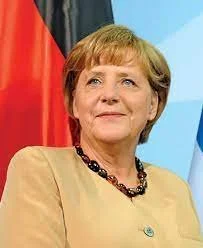She was born in East Germany to a pastor in training and a Latin and English teacher. For 35 years she lived in Soviet-controlled East Germany, even being asked at one point as a Young Pioneer to become an informant for the Stasi, the East German Ministry for State Security -- which she declined.
Although she studied physics at Karl Marx University (now the University of Leipzig) and, armed with a doctorate in physical chemistry, became a university professor, Angela Merkel's interest in politics eventually led her to become the spokesperson for the Democratic Awakening, an organization formed in Eastern Germany after the fall of the Berlin Wall in 1989.
One thing led to another, and she soon found herself first a member of Parliament, then Minister for Women and Youth under Chancellor Helmut Kohl. Gaining ever more recognition, she rose to become the first female, the first East German, and the youngest ever Chancellor (head of state) of the united Germany.
But what is in many ways the most remarkable thing about Angela Merkel is that she is...well, unremarkable.
That is, in the sense that for much of her career she has accomplished much while going unnoticed.
So much of her style flies in the face of what we Americans often consider essential for success in politics. Let's face it, we want to follow someone with charisma, someone who can command a crowd. In a word, someone who makes themselves irresistible.
Kati Marton, the award-winning journalist and author who has just published a biography of Angela Merkel, says...
"She gets things done by not taking credit for them."
What a concept.
And yet she is the longest-serving head of government in the European Union, steering Europe's largest economy through one trial after another. It was she who was behind Germany opening its doors to close to a million refugees fleeing the Syrian civil war in 2015-16, and yes, she paid a price for taking that stand. But still, as she prepares to leave office (voluntarily), her popularity ratings remain astonishingly high.
Another piece of this story is the Northern European tendency to avoid elevating political leaders to celebrity status. This is what cultural sociologists call "low power distance". In other words, the distance between national leaders and the common people is not that great. Ms. Merkel and her husband, chemist Joachim Sauer, live in a simple flat in Berlin. He reportedly often takes a discount airline to join his wife on vacation.
Early in her political career, Merkel gained the nickname "Mutti", the German equivalent of "Mom" for North Americans and "Mum" for other English-speaking countries. This was no compliment at the time, as her hard line competitors patronizingly tried to squelch her already quiet presence. Now, fifteen years after she took office, Mutti has a whole new meaning, used with admiration for a woman who turned out to be quite remarkable after all.
